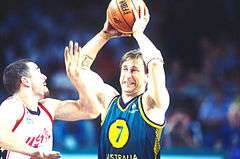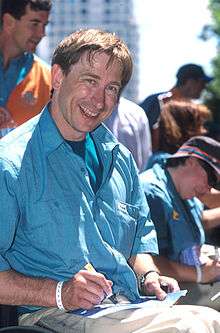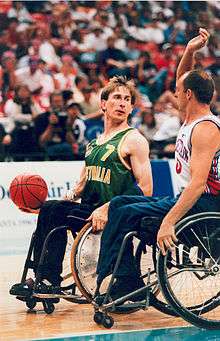Sandy Blythe
Robert Alexander "Sandy" Blythe, OAM[1][2] (24 February 1962 – 18 November 2005) was an Australian wheelchair basketball player. He became a paraplegic due to a car accident in 1981, and went on to participate in the Australia men's national wheelchair basketball team at four Paralympic Games, captaining the gold-medal-winning team at the 1996 Atlanta Paralympics. He committed suicide in 2005 at the age of 43 after a long illness.
 Sandy Blythe in action during competition at the 2000 Sydney Paralympics | |||||||||||
| Personal information | |||||||||||
|---|---|---|---|---|---|---|---|---|---|---|---|
| Full name | Robert Alexander Blythe | ||||||||||
| Nationality | |||||||||||
| Born | 24 February 1962 Geelong, Australia | ||||||||||
| Died | 18 November 2005 (aged 43) Melbourne, Australia | ||||||||||
Medal record
| |||||||||||


Biography
Blythe was born in Geelong on 24 February 1962.[3] He grew up in a farm outside the Victorian town of Derrinallum and was a champion Australian rules football player as a teenager. He played in the Teal Cup and was later part of the St Kilda Football Club country squad.[4] In 1981, he began studying at the Ballarat College of Advanced Education, but later that year, he was involved in a three-car collision that rendered him paraplegic.[4][5] In 1984 he obtained his physical education degree on schedule, despite his six-month rehabilitation at Austin Hospital.[5]
He was part of the Australia men's national wheelchair basketball team at the 1988 Seoul, 1992 Barcelona, 1996 Atlanta, and 2000 Sydney Paralympics.[6] He was the captain of the team when it won a gold medal at the 1996 Atlanta Games and was co-captain with Priya Cooper of the Australian Paralympic team at the 2000 Sydney Games.[7][8] He had an Australian Institute of Sport scholarship in 1998 for wheelchair basketball.[9]
Blythe was also a motivational speaker who formed and worked in several businesses that improved public awareness of people with disabilities.[4][5] In 2000, he released a memoir, Blythe Spirit.[10]
On 18 November 2005, Blythe committed suicide; he had been suffering from depression and chronic fatigue syndrome for several years.[4][11] He was survived by his partner of eight years, wheelchair basketballer Paula Coghlan.[12]
Recognition
Blythe received a Medal of the Order of Australia in 1997 for his 1996 gold medal.[1] In 2000, he received an Australian Sports Medal.[2] The Sandy Blythe Medal, awarded to the best player of the year in the Australia men's national wheelchair basketball team, is named in his honour.[13] In 2010, he was posthumously inducted into the Australian Basketball Hall of Fame.[7]
References
- "Blythe, Robert, OAM". It's an Honour. Retrieved 16 January 2012.
- "Blythe, Robert Alexander: Australian Sports Medal". It's an Honour. Retrieved 16 January 2012.
- "Australians at the 1996 Atlanta Paralympics: Wheelchair Basketball". Australian Sports Commission. Archived from the original on 19 January 2000.
- Petrie, Andrea (19 November 2005). "Disabled basketball champion dies at 43". The Age. p. 7. Retrieved 16 August 2012.
- Campbell, Di (20 December 2005). "Sandy Blythe". University of Ballarat. Archived from the original on 3 April 2012. Retrieved 16 August 2012.
- Results for Blythe from the International Paralympic Committee (archived). Retrieved 16 August 2012.
- "Sandy Blythe". Basketball Australia. Retrieved 16 August 2012.
- Grant, Freya (6 December 2000). "Blythe shares early lead – name a supercat". The Daily Telegraph. p. 18.
- Nihil, G. (2006). Australian Institute of Sport : celebrating excellence. Focus Publishing. p. 104. ISBN 1-921156-16-3.
- Blythe, Sandy (2000). Blythe Spirit. Sydney: Pan MacMillan. ISBN 9780732910273.
- Petrie, Andrea (25 November 2005). "Farewell to a champion athlete for whom life had lost its crucial blithe spirit". The Age. p. 8. Retrieved 16 August 2012.
- Edmund, Sam (22 November 2005). "Tributes flow for trailblazer; Tragic death of Paralympian". Herald Sun. p. 9.
- "Groenewegen named Sandy Blythe medalist". Basketball Australia. 25 May 2008. Retrieved 16 August 2012.